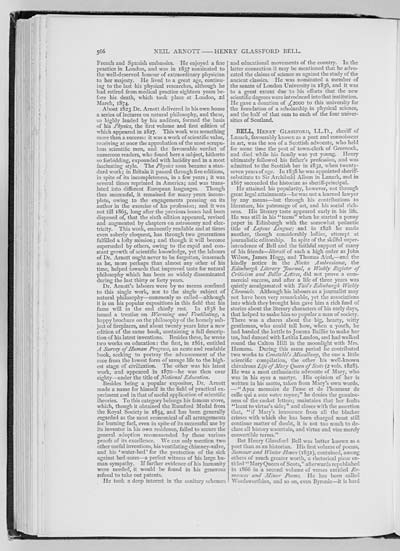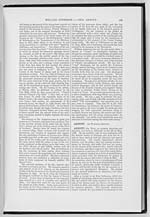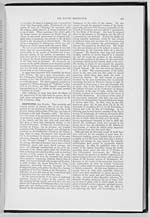Volume 3 > Half-Volume 6
(212) Page 566 - Bell, Henry Glassford
Download files
Individual page:
Thumbnail gallery: Grid view | List view

566 French and Spanish embassies. He enjoyed a fine practice in London, and was in 1837 nominated to the well-deserved honour of extraordinary physician to her majesty. He lived to a great age, continu- ing to the last his physical researches, although he had retired from medical practice eighteen years be- fore his death, which took place at London, 2d March, 1874. About 1823 Dr. Arnott delivered in his own house a series of lectures on natural philosophy, and these, so highly lauded by his auditors, formed the basis of his Physics, the first volume and first edition of which appeared in 1827. This work was something more than a success: it was a work of scientific value, receiving at once the approbation of the most scrupu- lous scientific men, and the favourable verdict of numerous readers, who found here a subject, hitherto so forbidding, expounded with lucidity and in a most fascinating style. The Physics soon became a stan- dard work; in Britain it passed through five editions, in spite of its incompleteness, in a few years; it was several times reprinted in America; and was trans- lated into different European languages. Though thus successful, it remained for many years incom- plete, owing to the engagements pressing on its author in the exercise of his profession; and it was not till 1865, long after the previous issues had been disposed of, that the sixth edition appeared, revised and augmented by chapters on astronomy and elec- tricity. This work, eminently readable and at times even soberly eloquent, has through two generations fulfilled a lofty mission; and though it will become superseded by others, owing to the rapid and con- stant growth of scientific knowledge, yet the labours of Dr. Arnott ought never to be forgotten, inasmuch as he, more perhaps than almost any other of his time, helped towards that improved taste for natural philosophy which has been so widely disseminated during the last thirty or forty years. Dr. Arnott's labours were by no means confined to this single work, nor to the single subject of natural philosophy�commonly so called�although it is on his popular expositions in this field that his fame will in the end chiefly rest. In 1838 he issued a treatise on Warming and Ventilating, a happy brochure on the philosophy of the homely sub- ject of fireplaces, and about twenty years later a new edition of the same book, containing a full descrip- tion of his latest inventions. Besides these, he wrote two works on education: the first, in 1861, entitled A Survey of Human Progress, an acute and readable book, seeking to portray the advancement of the race from the lowest form of savage life to the high- est stage of civilization. The other was his latest work, and appeared in 1870�he was then over eighty�under the title of National Education. Besides being a popular expositor, Dr. Arnott made a name for himself in the field of practical ex- periment and in that of useful application of scientific theories. To this category belongs his famous stove, which, though it obtained the Rumford Medal from the Royal Society in 1854, and has been generally regarded as the most economical of all arrangements for burning fuel, even in spite of its successful use by its inventor in his own residence, failed to secure the general adoption recommended by these various proofs of its excellence. We can only mention two other useful inventions, his ventilating chimney-valve, and his 'water-bed' for the protection of the sick against bed-sores�a perfect witness of his large hu- man sympathy. If further evidence of his humanity were needed, it would be found in his generous refusal to take out patents. He took a deep interest in the sanitary schemes and educational movements of the country. In the latter connection it may be mentioned that he advo- cated the claims of science as against the study of the ancient classics. He was nominated a member of the senate of London University in 1836, and it was to a great extent due to his efforts that the new scientific degrees were introduced into that institution. He gave a donation of �2000 to this university for the foundation of a scholarship in physical science, and the half of that sum to each of the four univer- sities of Scotland. BELL, HENRY GLASSFORD, LL.D., sheriff of Lanark, favourably known as a poet and connoisseur in art, was the son of a Scottish advocate, who held for some time the post of town-clerk of Greenock, and died while his family was yet young. Henry ultimately followed his father's profession, and was admitted to the Scottish bar in 1832, when twenty- seven years of age. In 1838 he was appointed sheriff- substitute to Sir Archibald Alison in Lanark, and in 1867 succeeded the historian as sheriff-principal. He attained his popularity, however, not through great legal attainments�he was not a learned lawyer by any means�but through his contributions to literature, his patronage of art, and his social rich- ness. His literary taste appeared early in his life. He was still in his "teens" when he started a penny paper in Edinburgh with the somewhat pedantic title of Lapsus Lingu�; and in 1828 he made another, though considerably loftier, attempt at journalistic editorship. In spite of the skilful super- intendence of Bell and the faithful support of many of his friends�literati of such a high order as John Wilson, James Hogg, and Thomas Aird,�and the kindly notice in the Nodes Ambrosian�, the Edinburgh Literary Journal, a Weekly Register of Criticism and Belles Letlres, did not prove a com- mercial success, and after a life of three years was quietly amalgamated with Tait's Edinburgh Weekly Chronicle. Although his labours as a journalist may not have been very remarkable, yet the associations into which they brought him gave him a rich fund of stories about the literary characters of his early days, that helped to make him so popular a man of society. There was a charm about the big, hearty, witty gentleman, who could tell how, when a youth, he had handed the kettle to Joanna Baillie to make her tea, had danced with Letitia Landon, and had walked round the Calton Hill in the moonlight with Mrs. Hemans. During this same period he contributed two works to Constables Miscellany, the one a little scientific compilation, the other his well-known chivalrous Life of Mary Queen of Scots (2 vols. 1828). He was a most enthusiastic advocate of Mary, who was in his eyes a martyr. His opinion of her is written in his motto, taken from Mary's own words, �"Ayez memoire de 1'ame et de 1'honneur de celle qui a este votre royne;" he denies the genuine- ness of the casket letters; maintains that her faults "leant to virtue's side;" and closes with the assertion that, "if Mary's innocence from all the blacker crimes with which she has been charged must still continue matter of doubt, it is not too much to de- clare all history uncertain, and virtue and vice merely convertible terms." But Henry Glassford Bell was better known as a poet than as an historian. His first volume of poems, Summer and Winter Hours (1831), contained, among others of much greater worth, a rhetorical piece en- titled " Mary Queen of Scots," afterwards republished in 1866 in a second volume of verses entitled Ro- mances and Minor Poems. He has been called Wordsworthian, and so on, even Byronic�it is hard
Set display mode to:
![]() Universal Viewer |
Universal Viewer | ![]() Mirador |
Large image | Transcription
Mirador |
Large image | Transcription
Images and transcriptions on this page, including medium image downloads, may be used under the Creative Commons Attribution 4.0 International Licence unless otherwise stated. ![]()
| Biographical dictionary of eminent Scotsmen > Volume 3 > Half-Volume 6 > (212) Page 566 - Bell, Henry Glassford |
|---|
| Description | Volume III. Contains names alphabetically from Macadam to Young. |
|---|

